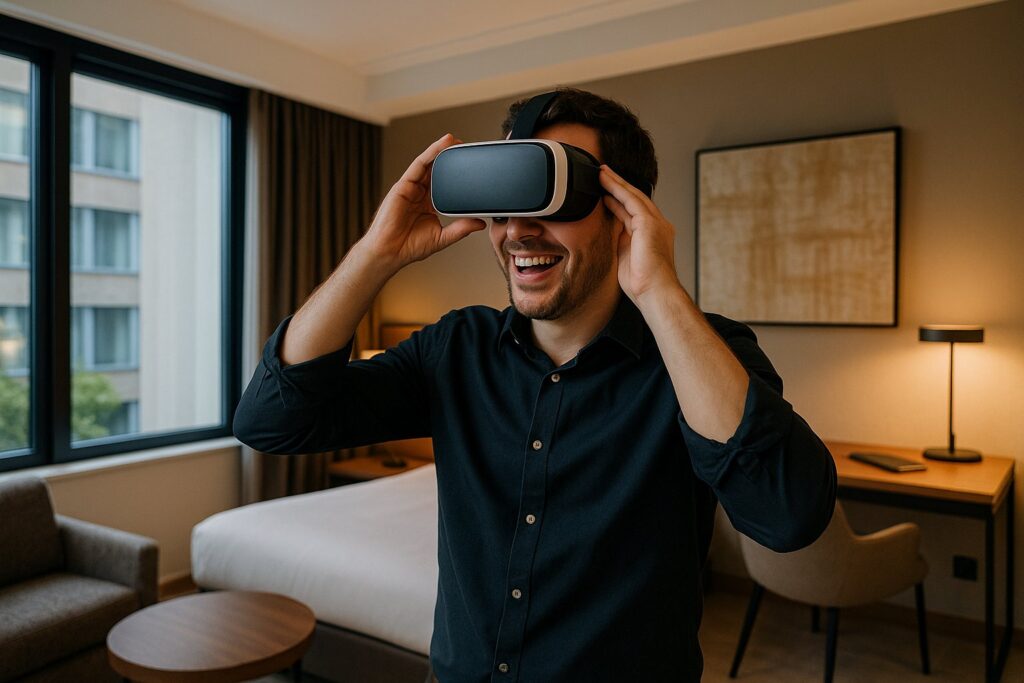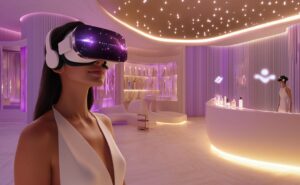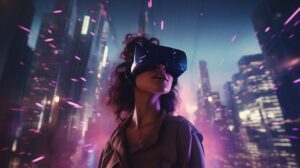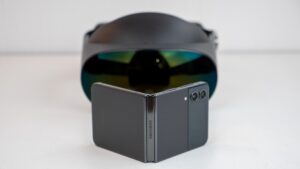In the world of five-star resorts and exclusive retreats, luxury has always meant elegance, discretion, and exceptional human touch. But as expectations evolve, today’s guests seek immersive digital experiences that complement that warmth. The rise of AI and XR in Luxury Hospitality sets a new standard, blending emotional intelligence with cutting-edge innovation to create seamless, unforgettable journeys.
According to a recent report, the global luxury hospitality segment was valued at about $154.32 billion in 2024, projected to reach $166.41 billion in 2025, and exceed $218 billion by 2029. Meanwhile, data‑driven trends show that hyper‑personalisation, immersive technologies, and guest‑experience metrics are no longer optional.
Who are luxury travellers and what do they truly want?
Modern luxury travellers are experience-driven digital sophisticates. They include high-net-worth individuals, global entrepreneurs, and creative nomads; all united by a desire for emotional personalization and convenience.
| Traveler Type | Motivation | Preferred Tech Touchpoint |
| Affluent Millennials | Social storytelling, discovery | AR/VR content and virtual tours |
| Business Elites | Efficiency and privacy | AI concierges and predictive itineraries |
| Luxury Nomads | Flexibility and personalization | Mobile XR experiences |
| Cultural Seekers | Meaningful engagement | AR storytelling and digital heritage guides |
Younger generations are rising in importance: one report states that Millennials and Gen Z will represent over 60‑70% of luxury purchases by 2030. Furthermore, according to a benchmark report of 39 million reviews across 11,200 properties, guest expectations are shifting, with an increasing desire for more personalised and tech-enabled experiences.
The Power Duo: AI and XR Transform Guest Experience
The integration of AI and XR in Luxury Hospitality transforms the industry’s DNA. It reshapes how hotels anticipate, engage, and serve guests across every phase of the journey.
1. Anticipating Desires Before They’re Spoken
AI in luxury hospitality is like a digital maître d’ or hotel manager. By analyzing guest data, including previous stays and browsing habits, AI systems can craft highly personalized experiences. A returning guest might find their favorite wine chilled in the room, their preferred pillow on the bed, and activity recommendations tailored to their past interests. One industry source highlights generative AI and hyper-personalization as among the most powerful data trends in hospitality in 2025.
2. AI Concierge Services and Virtual Assistants
Gone are the days of waiting at the front desk. AI concierges, powered by natural language processing and emotional tone recognition, provide 24/7, human-like service. These systems respond in real‑time, process bookings, and detect mood based on guest interaction patterns. According to an industry insight, AI‑powered chatbots handle up to 70% of customer inquiries in hotels.
3. Operational Excellence Behind the Scenes
AI doesn’t just elevate the guest experience; it revolutionizes hotel operations. From predictive maintenance to real‑time occupancy optimisation and intelligent energy management, hotels are streamlining behind‑the‑scenes workflows. A 2025 tech‑trends report states that “Hotel guests will use augmented reality to customise room elements like virtual wallpaper and lighting in real time” and that AI and automation reshape operations.
4. Virtual Hotel Tours: The New Standard for Pre-Booking
Virtual reality (VR) now sets the standard for a property’s first impression. Guests can explore suites, event spaces, and villas before booking. One survey found that technologies such as augmented and virtual reality are growing rapidly in the travel and tourism industry, supporting immersive exploration.
5. Immersive On-Site Experiences: Turning Spaces Into Stories
Extended Reality (XR) turns every corner of a hotel into an interactive narrative.
- Guests can point their phone at an artwork to unlock its story via AR.
- In the spa, XR-guided meditation experiences create personalized relaxation environments.
- Dining rooms offer AR menus that pair dishes with 3D ingredient animations or chef commentary.
Projects like this world´s first virtual vision board from Lifeboard demonstrate how virtual spaces and immersive storytelling have a positive impact on relaxation and mindfulness. When applied to hospitality, this same approach transforms dining, culture, and wellness into unforgettable sensory journeys.
6. Staff Training with VR Simulations
Behind every luxury brand is a well-trained, confident team. VR training delivers consistent excellence without disrupting daily operations.YORD’s Virtual Reality Training Solutions show that immersive simulations can increase staff retention by 40% and reduce onboarding time by 60%.
| Scenario | VR Application | Outcome |
| Five-star dining | Realistic service simulations | Improved timing & etiquette |
| Emergency protocols | Crisis-response training | Faster, safer reactions |
| Guest empathy | Role-reversal VR modules | Higher service empathy scores |
For instance, check out this VR CPR Training Course, designed to simplify traditional training and provide an additional learning tool for employees. This software allows them to experience a realistic environment in which they can practice their skills.
Why AI and XR in Luxury Hospitality Is a Business Imperative
| Metric | Impact of AI & XR Adoption |
| Global XR market size: US $183.96 billion in 2024, projected to reach US $1,625.48 billion by 2032 | Demonstrates the massive long‑term growth opportunity for XR technologies in enterprises and hospitality. |
| Organisations using XR devices: 45% currently, and an additional 39% seriously considering deployment | Shows that nearly 84% of businesses are engaging with XR in some way, signalling strong adoption momentum. |
| Marketing/tech organisations reporting lift from AI‑driven personalisation: 25% ROI increase, companies saw ~20% sales lift | Illustrates how AI‑powered personalisation drives measurable business results, applicable to the luxury hospitality experience. |
| Organisations stating “workflow automation” is the top AI priority in 2024: 39% | Highlights that enterprises are focusing on automating processes, which is relevant when hotels streamline operations via AI. |
Luxury Hospitality Transformed
The convergence of AI and XR in luxury hospitality will define the next decade. According to industry commentary, trends such as generative XR, AI‑driven personalisation, and wearable AR will dominate the guest journey.In 2025 and beyond, luxury hotels will likely:
- Deploy AI avatars as real‑time personal concierges, providing customised suggestions and services aligned with guest mood and behaviour.
- Offer XR‑enhanced rooms that adapt to mood, weather and guest profile, facilitating dynamic environments rather than static décor.
- Utilise predictive AI for maintenance, energy sustainability and staff optimisation, reducing costs and elevating service quality simultaneously.
- Extend post‑stay engagement through AR keepsakes, virtual memory rooms or WebXR follow‑up experiences, reinforcing loyalty and emotional connection.
A key takeaway from Deloitte’s 2025 outlook is that the most successful luxury brands will merge digital excellence with emotional empathy.
FAQs section
Q1: How can AI and XR improve ROI in luxury hospitality?
AI and XR enhance ROI by increasing operational efficiency, reducing manual workloads, and enabling personalized guest experiences that drive loyalty and repeat bookings. Predictive AI can optimize staffing and energy use, while immersive XR experiences can justify premium pricing and boost ancillary revenue streams, such as upselling spa or dining services.
Q2: What are the challenges of implementing AI and XR in luxury hotels?
Challenges include initial investment costs, integration with legacy systems, and ensuring staff are trained to leverage these technologies effectively. Hotels must also maintain data privacy standards and balance immersive tech with authentic human interaction to avoid creating impersonal experiences.
Q3: How do AI and XR support brand differentiation in a competitive market?
AI and XR enable hotels to craft bespoke guest journeys and highly personalized experiences that are difficult to replicate. Immersive storytelling, AR-enhanced environments, and predictive services strengthen brand identity, increase guest engagement, and create memorable moments that distinguish one luxury brand from another.
Q4: Can AI and XR improve employee training and retention?
Yes. VR and XR simulations provide immersive, hands-on training without disrupting daily operations. Employees can practice service protocols, emergency responses, and guest interactions in realistic scenarios. This reduces onboarding time, improves skill retention, and fosters confidence, ultimately increasing staff satisfaction and reducing turnover.
Q5: How do AI-driven insights influence strategic decision-making?
AI analytics provide real-time insights into guest preferences, booking patterns, and operational efficiency. Luxury hotels can use this data to adjust marketing campaigns, optimize room pricing, forecast demand, and allocate resources more effectively, turning data-driven intelligence into a competitive advantage.
Q6: What is the future outlook for AI and XR in the luxury hospitality sector?
The adoption of AI and XR is expected to accelerate, with emerging technologies such as generative XR, AR wearables, and AI avatars becoming the norm. Hotels that invest now in immersive, intelligent solutions will define next-generation guest experiences, drive long-term loyalty, and position themselves as leaders in a tech-enabled luxury landscape.
Conclusion
AI and XR in Luxury Hospitality go beyond digital transformation. They are a renaissance of service itself. In this new era, technology doesn’t replace the human touch; it amplifies emotion, connection, and memory. The hotels that embrace this technology will not only meet expectations but also define the future of luxury.
At YORD, we design immersive and intelligent technologies that elevate the hospitality experience. Recognized by Deloitte and awarded by Clutch as a Top XR Agency worldwide, our AI and XR solutions have helped over 120 brands worldwide. Whether you’re aiming to reimagine your guest experience, transform training and operations, or develop bespoke immersive storytelling, we’ll help you bring your vision to life.




